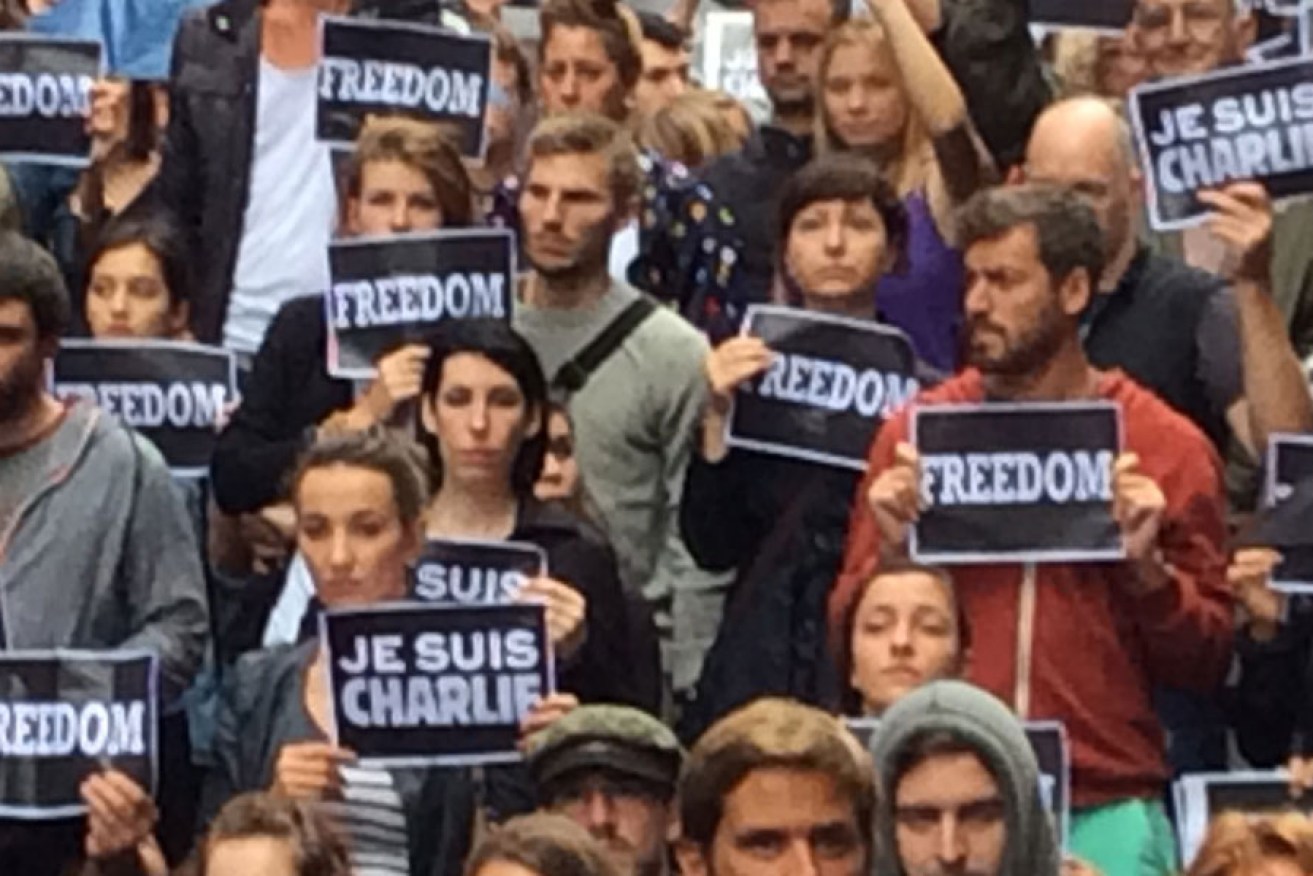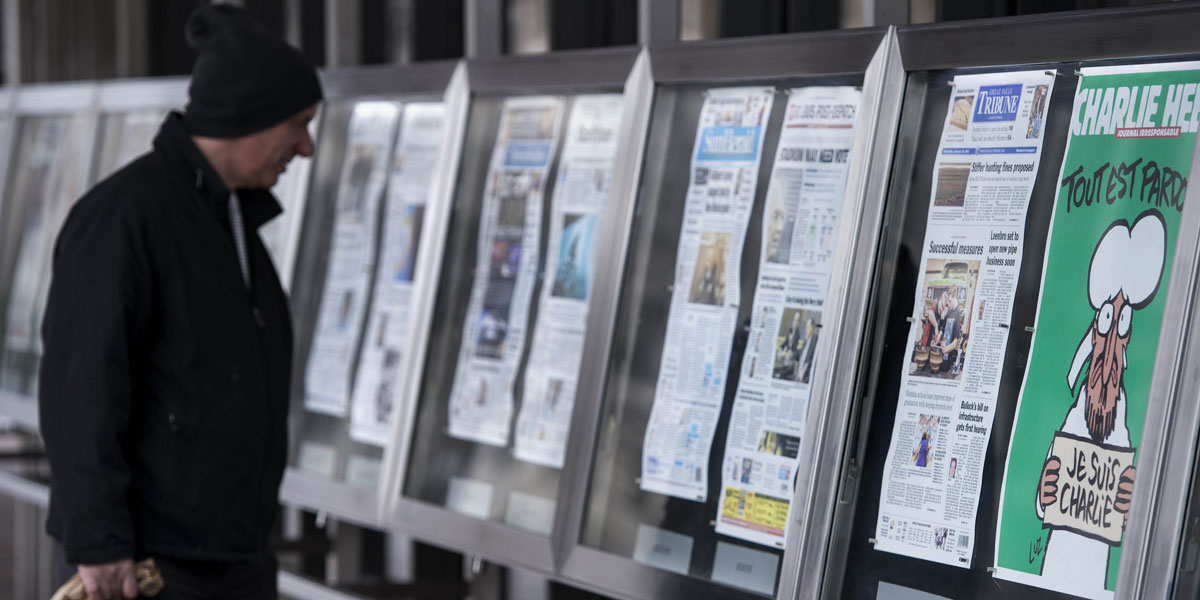Richardson: Je suis anti-vaxxer?

Attendees hold "Je Suis Charlie" signs during a solidarity rally in Martin Place, Sydney.
Last week, an osteopath named Sherri Tenpenny – a high-profile US exponent of the tinfoil-hat brigade railing against the immunisation of children – was effectively banned from preaching her contentious and potentially dangerous anti-vaccination gospel in Australia.
A campaign by members of the medical fraternity to silence her – culminating in that very modern mode of grassroots protest, a social media hashtag campaign – prompted several conference venues booked to host the Tenpenny Tour to cancel in the face of the public naming and shaming.
And yet, oh so bizarrely, not one of the enlightened hordes hit the social network to claim: Je suis Sherri.
No-one offered her a consoling cyber-arm around the proverbial shoulder, offering to “ride with her”, even symbolically.
Silencing the cult medico’s dangerous rhetoric might have been a victory for logic; it might have been a triumph for public safety. But not for free speech.
We pride ourselves on our freedom of expression in Australia, even as we pride ourselves on our tolerance and diversity. And yet, when George Brandis moved to amend the infamous section 18C of the Racial Discrimination Act – the bit that prevents actions likely to offend, insult, humiliate or intimidate a group because of race, colour or ethnic origin – his argument that “people have a right to be bigots” created a national furore.
“In a free country,” Brandis thundered in the cauldron of Senate Question Time, “people do have rights to say things that other people find offensive or insulting or bigoted”.
That’s true. But not so much in this country.
Those who died in the Charlie Hebdo attack have become martyrs to free speech, and that is appropriate, but if the argument over the limits of that freedom are too nuanced for Brandis’s inelegant diatribe, they’re certainly too subtle to be crammed into the simplistic slogan: “Je suis Charlie”.
The fact is, as others have already pointed out, we are not Charlie. Not even close.
In my Facebook feed, at least one person had literally posted a “Je suis Charlie” invocation directly beneath a news article celebrating the cancellation of Tenpenny’s talks.
The cultural empathy that collectively responded to Sydney’s Martin Place siege with the hashtag #illridewithyou would never have stood for a publication whose idea of social satire is a cartoon of the prophet exposing his genitals.
As US commentator David Brooks wrote in the New York Times: “Most of us don’t actually engage in the sort of deliberately offensive humour that newspaper specializes in.
“Most of us do try to show a modicum of respect for people of different creeds and faiths. We do try to open conversations with listening rather than insult.”
Charlie Hebdo’s schtick, on the other hand, is designed to offend; it makes Richard Neville’s Oz magazine – famously and shamefully the subject of a 1960s obscenity trial – seem like high art.
If health experts and others who rallied round the Stop Tenpenny cause say the interests of public safety should override those of free speech, the same argument can be applied to the French publication. Its publishers had no doubt they were potentially provoking violence. Its editor, Stéphane Charbonnier, had even hired a bodyguard after insistent threats on his life – both were killed in the attack.
Did those working at Charlie Hebdo deserve their fate? Of course not. And it is right that the world has expressed solidarity with their right to freedom of expression.
But that does not mean we have to celebrate their work, or republish contentious images designed to provoke a religion that fundamentally believes it is blasphemous and sacrilegious to illustrate the Prophet Mohammed in any pictorial form, let alone prone and naked.
If there was a sad irony in the fact leaders from countries with objectively appalling tolerance of press freedom – among them Egypt, Turkey, Russia, Algeria and the United Arab Emirates – marched with the Paris millions in solidarity, the left’s social media brigade has similarly appeared blissfully, perhaps deliberately, ignorant of the uncomfortable juxtaposition of its recent slogan-led campaigns. In my Facebook feed, at least one person had literally posted a “Je suis Charlie” invocation directly beneath a news article celebrating the cancellation of Tenpenny’s talks.
But the awkward truth is, if we want to trumpet true freedom of speech, we must be prepared to extend it to people we actually disagree with, and not merely edgy Parisian artists needlessly, brutally slaughtered by terrorists.
We must trumpet it for negligent anti-vaxxers who put their and others’ children at risk, or for Twitter trolls who push their sick agenda on the vulnerable.
We have to not merely tolerate, but celebrate their bile. And then celebrate our freedom to argue against it.
We have to be willing to say “I am Sherri” when someone with whom we disagree so profoundly it makes us incandescent with anger is silenced in a democracy; and to benevolently tell rednecks and bigots: “I’ll ride with you.”
I don’t know about you, but that’s not something I’m about to do. So Je suis Charlie? Non.
Tom Richardson is a senior journalist at InDaily.
His political column is published every Friday.





